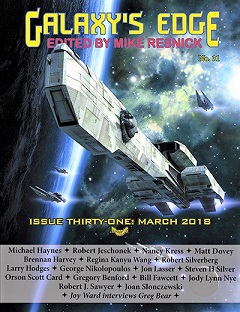 Galaxy’s Edge #31, March/April 2018
Galaxy’s Edge #31, March/April 2018
“Death Rides Shotgun” by Michael Haynes
Reviewed by Victoria Silverwolf
A majority of the nine stories in the latest issue of this on-line magazine are humorous, very short, or both. Most are science fiction, with a couple of fantasy stories included for good measure.
“Death Rides Shotgun” by Michael Haynes is a low-key character study. A man is driving to see his newborn granddaughter when the Grim Reaper shows up in his car. The story treats their relationship lightly. It lacks a dramatic conclusion, but is pleasant to read.
The protagonist of “The Stars So Black, the Space So White” by Robert Jeschonek is a human being aboard a starship full of many different kinds of aliens. When a sister starship disappears, he must join his colleagues in a journey into another plane of existence. The author displays a great deal of imagination in describing a wide variety of bizarre extraterrestrials. The story’s sweeping vision of multiple universes creates a sense of wonder. The plot is not quite as interesting as the setting and the aliens.
“Things Said to Me in the Anxari 12 Station Bar When I Said I Wasn’t a Xenosexual (and the Things I Wish I’d Had the Courage to Say in Reply)” by Matt Dovey is a brief comedy about unwanted sexual advances from aliens. There’s a minor twist at the end. It may provide mild amusement.
Time travel brings animals from the past into the future in “You Get Hit and Your Moose Goes Ping” by Brennan Harvey. The narrator inhabits an artificial moose in the present while the real moose journeys forward in time. Things quickly go wrong. This is a wry tale, with an ironic end.
“The Gift” by Regina Kanyu Wang is a very short story in which a galactic emperor obtains various rare items from all over the universe in an attempt to win back his lost queen. This is a quiet fable about facing the truth.
“The Electrifying Aftermath of a Demon Thrice Summoned” by Larry Hodges is a slapstick farce in which a hapless demon gets mixed up with opposing candidates in a Presidential election. The human characters are obviously based on real politicians. The humor is broad and sophomoric.
“The Sin of Envy” by George Nikolopoulos is another very short tale. An android faces destruction because it shows envy. The object of its envy is unexpected. This is a thoughtful, if minor, meditation on humans and machines.
Artificial people also appear in “Perfect Little Boy” by Jon Lasser. In a future of constant surveillance and secret trials, a robot takes the place of a judge’s son. Their relationship, and the robot’s growing awareness of its true nature, make for a powerful and compelling story.
The setting of “Doing Business at Hodputt’s Emporium” by Steven H Silver is a galactic marketplace, where aliens engage in illicit business deals. The narrator sells Brussels sprouts as recreational drugs. This is a comic adventure, full of action, but with a predictable outcome.
Victoria Silverwolf resisted the temptation to call this group of stories an ennead.